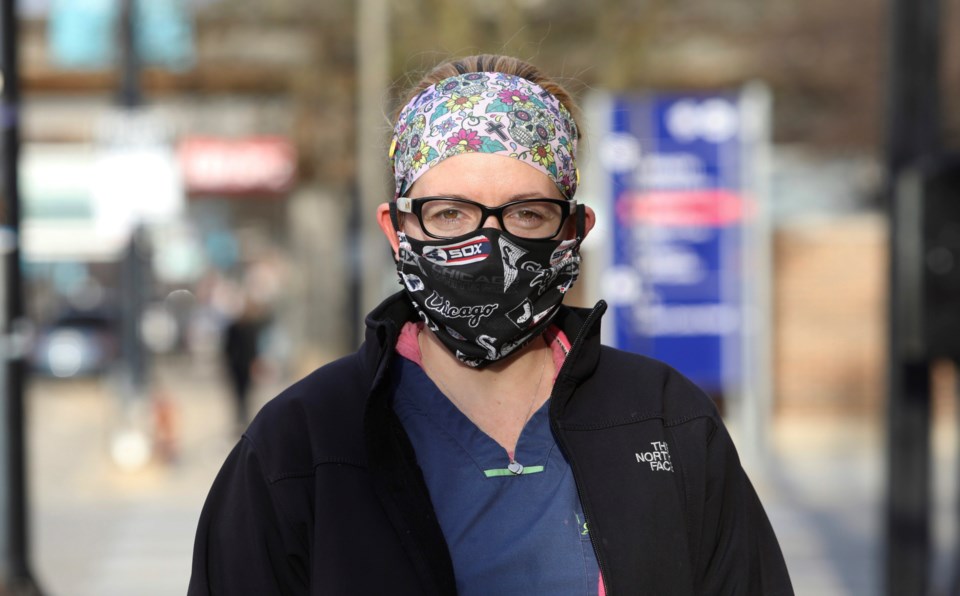Paramedics rushed another critical COVID-19 patient into the emergency room, and Chicago nurse Cynthia Riemer felt her adrenaline kick in.
“Your heart starts racing,” she said. “You're thinking, 'How quickly and safely can we get them intubated?' Because if we don't, in the next five or 10 minutes, they could stop breathing. You're thinking: 'What's my next step? Do we need more help?' The more people in the room, the more exposed, so staff stand outside the glass door and you say, ‘Hey, get me this! Hey, get me that!’”
Her protective gear: a hospital-supplied yellow gown, foot covers and an N95 mask — plus, from Home Depot, a welder’s mask, which she says "helps conserve what we have.”
Riemer is 41, a few years younger than a New Orleans ICU nurse who died last week from the virus. She and others became nurses to relieve suffering, to save lives. But with supply shortages, changing guidelines and evolving science, some now are asking: “Did I sign up to be a hero?”
One nurse in Baltimore, a father with young children, said he began to think about quitting his job after reading a scientific report that said the virus might spread not only in droplets, but also in tinier aerosolized particles. He worries, too, about mask shortages and poor crisis planning.
“Nobody wants to go to work and feel like they’re gambling,” said the nurse, who requested anonymity because he feared retaliation from his employer. "Very few of us get into this field to be heroes.”
Each day brings new questions for nurses, who are deciding how much they’re willing to sacrifice, said Cynda Rushton, professor of nursing and bioethics at Johns Hopkins University.
“Who am I? What do I stand for? How can I have integrity in the midst of this chaos?" she said. "How do I live with myself at the end of the day?”
One nurse posting in an online forum wrote Feb. 28: “The nightmare is real — and it has come home.” The posts will be collected and published in a report after the pandemic subsides. It already has a title: “Never Again.”
For weeks, hospitals and clinics across the United States have struggled to stay afloat amid a crippling shortage of personal protective equipment, including N95 masks, which filter out 95
“Absolutely I’m conflicted,” said Amber Weber, 38, a
“More than one family member has told me I should quit, that it’s not worth it,” said Weber, who has two young children. But her professional values won out.
“I didn’t go into the nursing profession to abandon my patients when their need is greatest,” she said, “or to abandon the other health care workers in the hospital when they’re drowning."
In Baltimore, nurse practitioner Katharine Billipp, 38, works with patients who are poor, very sick and staying in shelters, encampments or abandoned buildings. Two weeks ago, her husband came down with a fever and a dry cough, classic symptoms of COVID-19. She stayed home while awaiting his test results, which didn’t come back negative for almost two weeks, making her feel "completely useless” as she read about the worsening crisis.
Now back at work at Health Care for the Homeless, Billipp was given one surgical mask to last a week, which comes off only when she needs another cup of coffee.
“Reusing masks is a problem," she said. “It’s a petri dish to collect any airborne particles throughout the day,” Still, one mask for a week is better than no mask.
“The gray area of all of this, it takes a mental toll,” Billipp said. “We find ourselves on the front lines, without proper equipment, being the potential vector of disease to our underserved and most at-risk patients.”
The University of Illinois Hospital, where Riemer works, last week granted the hazard pay requested by the Illinois Nurses Association.
For his safety, Riemer and her husband are keeping six feet apart inside their house, but “you can’t just give up because it gets tough. That’s not an option," she said. In her free time, she is sewing cloth masks for co-workers.
“Do we cry? Sure, absolutely, we cry,” she said of her colleagues. “We get angry, we get frustrated. But the majority of us are not willing to give up.”
___
The Associated Press Health and Science Department receives support from the Howard Hughes Medical Institute’s Department of Science Education. The AP is solely responsible for all content.
Carla K. Johnson And Juliet Linderman, The Associated Press



